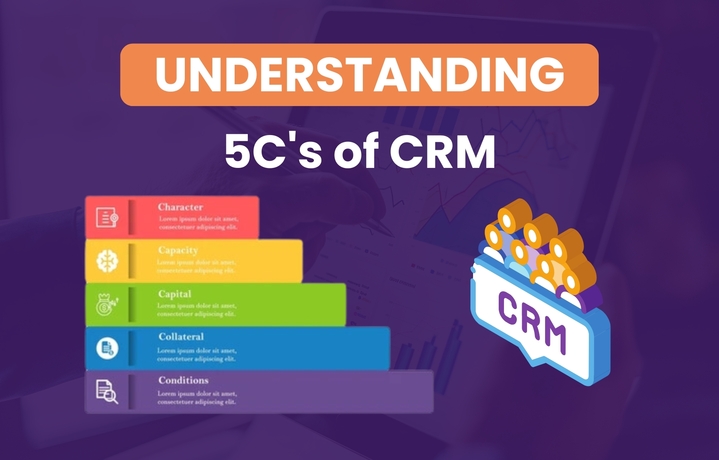Call or WhatsApp +923000113866
Email us: info@vamatters.com
"Harnessing the Power of AI to Enhance Customer Service, Streamline Marketing Efforts, and Boost Overall Productivity."
Understanding the 5 C's of CRM: Building Stronger Customer Relationships
Introduction
Understanding the 5 C's of CRM:
In the competitive landscape of modern business, successful customer relationships are key to long-term growth. One of the most effective tools for enhancing these relationships is Customer Relationship Management (CRM), which enables businesses to understand, communicate with, and serve their customers better.
A robust CRM strategy often revolves around the "5 C's"—Customer, Consistency, Convenience, Communication, and Collaboration. Together, these five elements provide a solid foundation for creating meaningful, enduring relationships with customers. Here’s an in-depth look at each of these essential components.


Using AI tools in your small business transforms how you handle customer service, content creation, and administrative tasks. These advanced tools deliver instant responses to inquiries, create engaging marketing content, and assist in data analysis and decision-making. Integrating AI tools boosts efficiency, enhances customer satisfaction, and allows greater focus on business growth. Automation of routine tasks ensures consistency and frees up resources for strategic initiatives, enabling personalized customer experiences and maintaining competitiveness in today's dynamic market.
5 C's of CRM
1. Enhancing Customer Support
1. Customer: The Core of CRM
Every CRM strategy begins and ends with the customer in mind, as they are the central focus. Understanding customer behavior, preferences, and needs allows businesses to tailor their services and products effectively. Through CRM systems, companies can gather insights into customers' buying patterns, preferences, and feedback, which in turn enables personalized marketing efforts and improves the overall customer experience. A customer-centric approach in CRM not only increases satisfaction but also fosters loyalty and encourages repeat business.
2. Consistency: Building Trust and Reliability
Consistency is key in establishing trust with customers. A reliable CRM strategy ensures that every interaction with the customer aligns with the brand's values and promises. Consistency in messaging, customer service, and product quality reinforces a positive perception, making customers feel valued. CRM tools facilitate this by storing customer data in one centralized place, allowing every team member to access accurate information and provide a seamless experience across all touchpoints. This reduces misunderstandings, increases reliability, and enhances the brand’s reputation.
3. Convenience: Enhancing the Customer Experience
Convenience is paramount. Customers appreciate brands that make their lives easier, whether through intuitive digital interfaces, prompt responses, or streamlined purchasing processes. A well-configured CRM system simplifies customer interactions by automating tasks and making information readily available. From chatbots that offer 24/7 assistance to personalized recommendations based on purchase history, CRM can greatly enhance convenience. By prioritizing the convenience of their customers, businesses can reduce friction in the buyer's journey and increase customer satisfaction.
4. Communication: Keeping the Connection Strong
Communication is the backbone of any strong customer relationship. CRM platforms help businesses maintain regular and meaningful communication with customers. By segmenting customer data, companies can send targeted emails, product updates, and special offers that align with individual preferences and interests. This type of targeted communication not only increases engagement but also reduces the likelihood of customers feeling overwhelmed by irrelevant messages. Good communication fosters transparency, builds trust, and enhances the emotional connection between a brand and its customers.
5. Collaboration: Ensuring a Unified Approach
Finally, Collaboration within the organization is crucial for delivering a cohesive customer experience. A CRM system encourages collaboration by allowing different teams—such as sales, marketing, and customer service—to access and share customer information seamlessly. When everyone in the organization works together with a shared understanding of each customer’s history and preferences, the entire customer journey becomes more cohesive and satisfying. This collaborative approach not only improves internal efficiency but also enhances the customer experience, as each interaction feels consistent and well-informed.

AI tools can seamlessly integrate into your website or customer service platform to deliver instant responses to inquiries. These tools handle FAQs, troubleshoot common issues, and provide information about products and services. By automating these tasks, your customer support team can concentrate on more complex issues, thereby enhancing efficiency and customer satisfaction. AI-powered solutions operate 24/7, ensuring customers receive assistance at any time, even outside regular business hours.
Conclusion
2. Generating Marketing Content
The 5 C’s of CRM are more than just principles—they’re essential building blocks for businesses looking to foster long-term, successful customer relationships. VA Matters understands the critical role each “C” plays in creating a CRM strategy that is truly effective. By focusing on the Customer, managing Costs, prioritizing Convenience, establishing clear Communication, and fostering Collaboration, we empower our clients to connect meaningfully with their customers, driving loyalty and growth.
If you’re ready to elevate your customer relationships with a CRM strategy built around the 5 C’s, reach out to VA Matters today. We’ll guide you in crafting a CRM system that aligns with your business goals and puts your customers first.
For more insights on CRM strategies and customer relationship management, stay tuned to VA Matters’ blog!

AI streamlines content creation processes across various platforms. Whether it's generating blog posts, social media updates, email newsletters, or ad copy, AI tools can provide prompts and outlines to expedite content generation while maintaining consistency and engagement. AI's capability to mimic different writing styles ensures your brand voice remains intact, facilitating effective communication with your audience.
3. Conducting Market Research

AI tools are instrumental in gathering and analyzing market research data. They can summarize industry reports, extract insights from large datasets, and generate survey questions to understand customer needs and preferences better. This data-driven approach informs strategic business decisions aligned with market trends and consumer behavior.
4. Personalizing Customer Interactions

Personalization drives customer loyalty and satisfaction. AI tools leverage customer data to tailor interactions, offering personalized recommendations, product suggestions, and targeted promotions. By analyzing past interactions and purchase history, AI enhances customer engagement, fostering long-term relationships and repeat business.
5. Assisting with Administrative Tasks

AI automates administrative tasks such as scheduling appointments, managing emails, and organizing files. These tools set reminders, draft professional communications, and streamline information retrieval, reducing human error and optimizing business operations. By freeing up time spent on routine tasks, AI enables focus on strategic initiatives.
6. Supporting E-commerce Operations

AI enhances the e-commerce experience by providing product information, answering queries, and guiding customers through the purchasing process. It also aids in inventory management by tracking stock levels and automating reorder notifications. These capabilities optimize e-commerce operations, improving customer satisfaction and operational efficiency.
7. Developing Training Materials

AI simplifies the creation of training materials such as guides, videos, and onboarding documents. These tools generate clear and concise content that facilitates comprehensive employee training on company policies and procedures, ensuring consistent understanding and adherence across teams.
8. Improving Internal Communication

Effective internal communication is vital for organizational cohesion. AI tools assist in drafting internal communications like memos, reports, and meeting summaries. They can also automate responses to common queries, ensuring timely and accurate information dissemination within the organization. By enhancing internal communication, AI fosters a collaborative and productive work environment.

Subscribe to our social
We’re on a mission to build a better future where technology creates good jobs for everyone.
© Copyright 2024. VA Matters (SMC-PRIVATE) Limited. All rights reserved.




